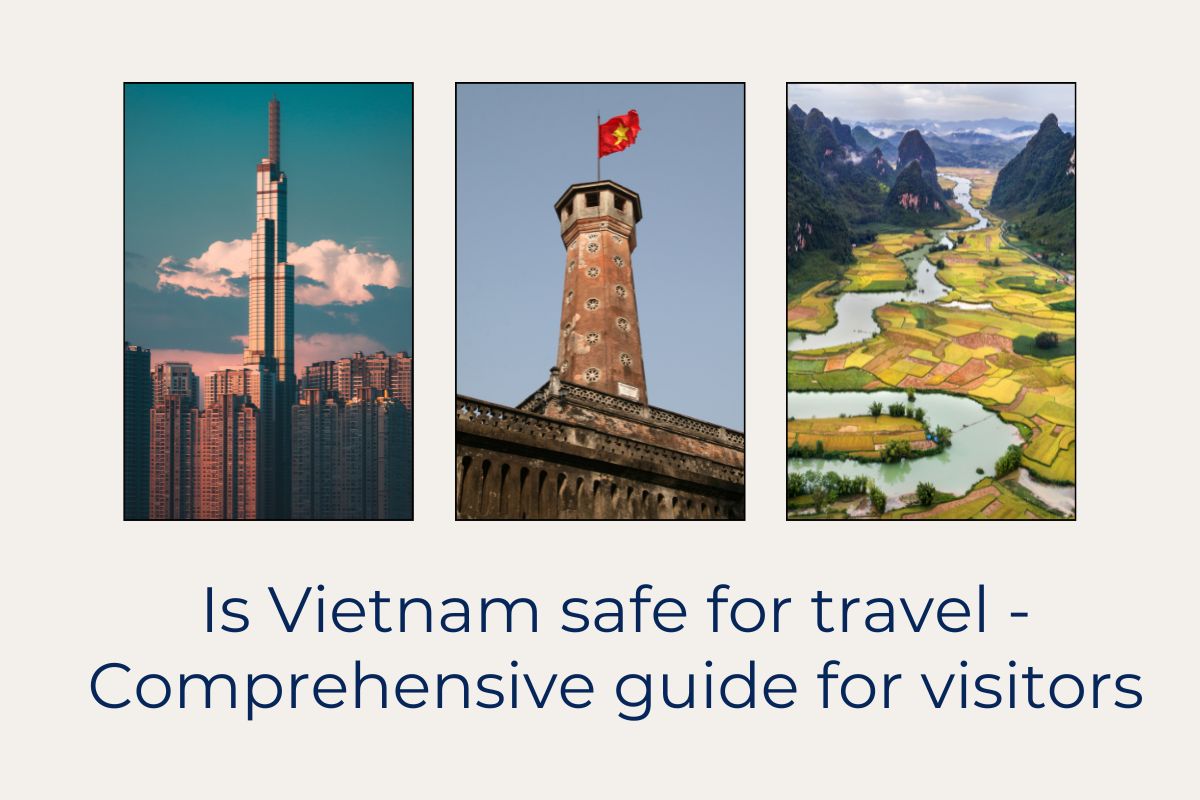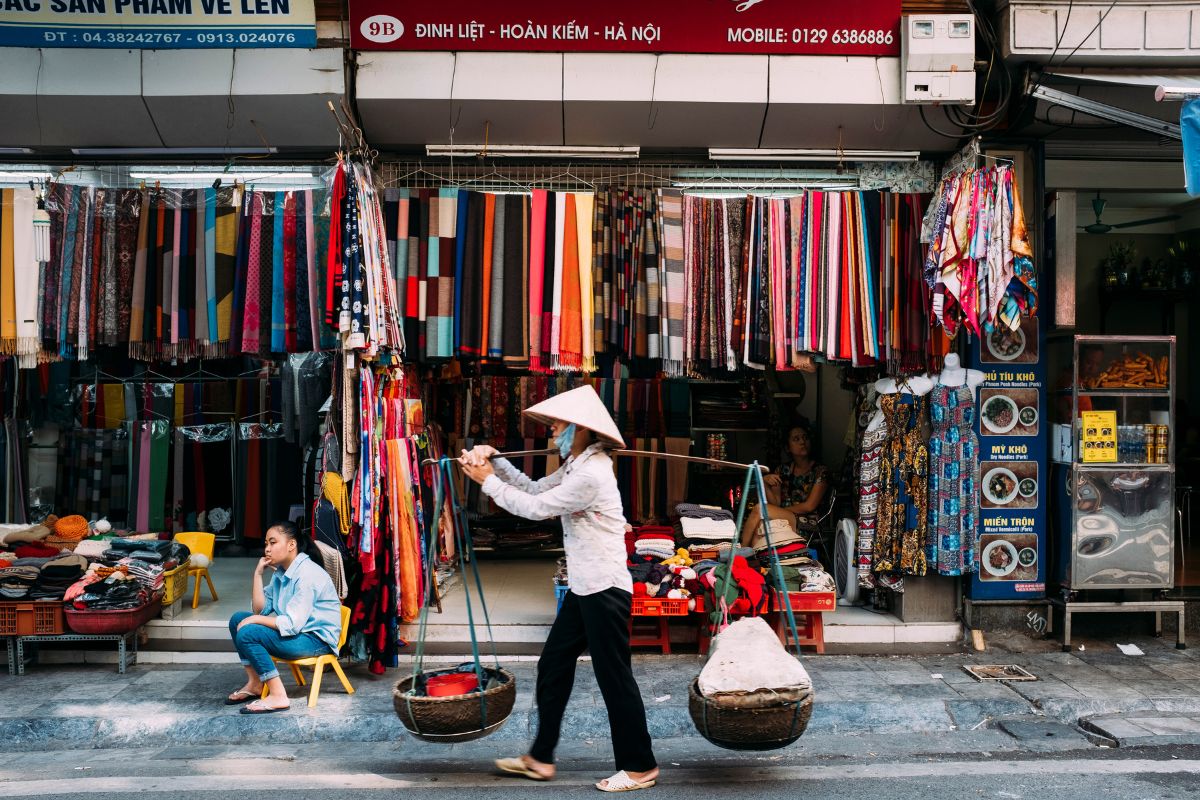Are you planning to visit Vietnam? It is a beautiful country with friendly locals and delicious cuisine, making it a wonderful destination to explore. However, you might be wondering: Is Vietnam safe to travel? This post will answer that question and provide essential travel safety tips for a stress-free trip as well.

Is Vietnam safe for travel?
Vietnam is generally a safe destination for travelers. Many visitors have reported that they had a good time and didn’t run into big problems. The local people are often friendly and welcoming, no matter where they are from.
Vietnam has low rates of violent crime, which means you can walk around most places in Vietnam without worrying too much.
However, you should know many safety considerations before going to Vietnam.
- Vietnam has a stable politic
Vietnam is characterized by a single-party socialist republic system, making this nation’s political situation stable.
Vietnam has also taken diverse bans to maintain law and order, ensuring a safe environment for locals and visitors.
- Vietnam has no terroism
Vietnam has not experienced any significant terrorist incidents for ages, and the government has implemented strict measures to prevent such activities. This contributes to the overall safety of the country.
- Vietnam has a relatively low crime rate
Compared to other countries in the region, Vietnam has a relatively low crime rate, particularly theft and robbery. Therefore, visitors may feel confident and safe when traveling to Vietnam.
- Vietnamese people are friendly and outgoing
Vietnamese people are renowned for their friendliness and hospitality, which makes the country a welcoming destination for travelers.
Come to Vietnam, locals are unwilling to help or give you pieces of advice if you face any difficulties.
Overall, should you visit Vietnam?
The answer is yes! Although there are still concerns for tourists, they are not serious problems and can be acceptable.
1. Vietnam has a reasonable price
- Vietnam is generally a cheap destination compared to many Western countries or other popular tourist destinations in Asia.
- You can find quite cheap accommodation in Vietnam. Even in tourist zones, you can get clean, beautiful, and comfortable rooms at a cheaper cost compared to other countries. In some hostels, they offer beds for as little as $5 per night. And budget hotels might charge $15-20 for a private room with air conditioning. Luxury hotels of course cost more, but still quite reasonable and worth the price you pay.
- The food here is super cheap especially if you eat like locals. You do not need to spend much on street food stands since they offer great meals at prices ranging from $1-$3. For example, a bowl of Pho or Banh Mi only costs you less than $2.
- Transportation costs are low too. City buses often charge less than 50 cents per ride. Grab (Southeast Asia’s version of Uber) offers affordable car and motorbike rides. For longer journeys, sleeper buses between cities are comfortable and cheap, often costing $10-15 for an overnight trip.
- Activities and sightseeing are often reasonable in Vietnam. Many temples and museums have very low entrance fees, sometimes just $1-2. Some famous tourist destinations might still be a bit costly, however, the prices, in general, are acceptable.
- Shopping can be very economical, especially in local markets. Clothing, souvenirs, and handicrafts are often available at prices that seem incredibly low to visitors from more expensive countries. However, be careful to avoid scams.
2. Are Vietnamese people friendly?
Vietnamese people are very friendly to visitors, which makes your trip more enjoyable.
You’ll often see locals smiling and willing to help, even if they don’t speak your language. Many are curious about where you’re from and enjoy chatting. In popular tourist areas, some Vietnamese people may even approach you to practice their English. The friendliness of Vietnamese people is one of the reasons why you should take a trip there.
Tips for safe travel in Vietnam
Traveling safely in Vietnam is generally straightforward, but it’s important to be aware of some local nuances to ensure a smooth and enjoyable trip. Here are some tips:
1. Traffic Awareness
Be cautious of the chaotic traffic, especially in big cities like Hanoi and Ho Chi Minh City. Motorbikes dominate the streets, and traffic rules may not always be followed.
When crossing the road, move steadily and avoid sudden stops; vehicles will maneuver around you.
If you’re planning to ride a motorbike, ensure you have an international driver’s license and wear a helmet. Be cautious of rental scams and always inspect the bike thoroughly.
2. Pickpocketing and Bag Snatching
Keep your belongings close in crowded places or on busy streets. Pickpocketing can happen, especially in tourist hotspots.
Avoid carrying valuables in open bags or placing them in back pockets. Consider using money belts or cross-body bags.
When sitting at outdoor cafes, don’t leave your bag on the ground or hanging on the back of a chair.

3. Scam Awareness
Agree on prices beforehand, especially with taxis, motorbike taxis (xe ôm), or vendors in markets. Use reputable companies like Mai Linh or Vinasun for taxis.
Be cautious of tourist traps or inflated prices in popular areas. Research and book tours through trusted agencies.
Watch out for “friendly locals” offering unsolicited advice or wanting to take you on a tour. They may try to charge you an excessive fee later.
4. Food and Drink Safety
Eat at reputable food stalls and restaurants. Vietnamese street food is delicious but ensure the food is freshly cooked and the stall looks clean.
Drink only bottled or boiled water. Ice is generally safe in most places, but if you’re unsure, avoid it.
Be cautious with alcohol, especially if offered rice wine or local spirits in rural areas, as it can sometimes be home-brewed and unregulated.
5. Health Precautions
Carry mosquito repellent, especially if you’re traveling to rural areas or during the rainy season. Diseases like dengue fever can be a concern in some parts of Vietnam.
Ensure you’re up to date on vaccinations recommended for Vietnam, such as hepatitis A, typhoid, and tetanus.
If you’re planning outdoor activities or visiting remote areas, bring a basic first-aid kit and any personal medications you need.
6. Respect Local Customs
Dress modestly when visiting temples or pagodas. Cover your shoulders and knees, and remove your shoes before entering sacred places.
Learn a few basic Vietnamese phrases, as it will be appreciated and can help in daily interactions.
7. Money and Valuables
Use ATMs inside banks or reputable locations, and avoid withdrawing large sums at once. Be mindful of ATM skimming in tourist areas.
Split your cash and cards into different places (hotel safe, day bag, etc.) to avoid losing everything if something gets stolen.
8. Accommodation Safety
Stay at trusted hotels or guesthouses. Read reviews before booking and ensure they have good security and safekeeping options.
Always lock your room and secure valuables when you’re out.
Vietnam is a welcoming and relatively safe country for travelers, but taking precautions will help you enjoy your trip with peace of mind!
Conclusion
In conclusion, you got the answer to the question. Is Vietnam safe? Yes, it is. You just need to be careful and follow these tips above, you can enjoy a wonderful time in Vietnam. Hope you have a wonderful trip!